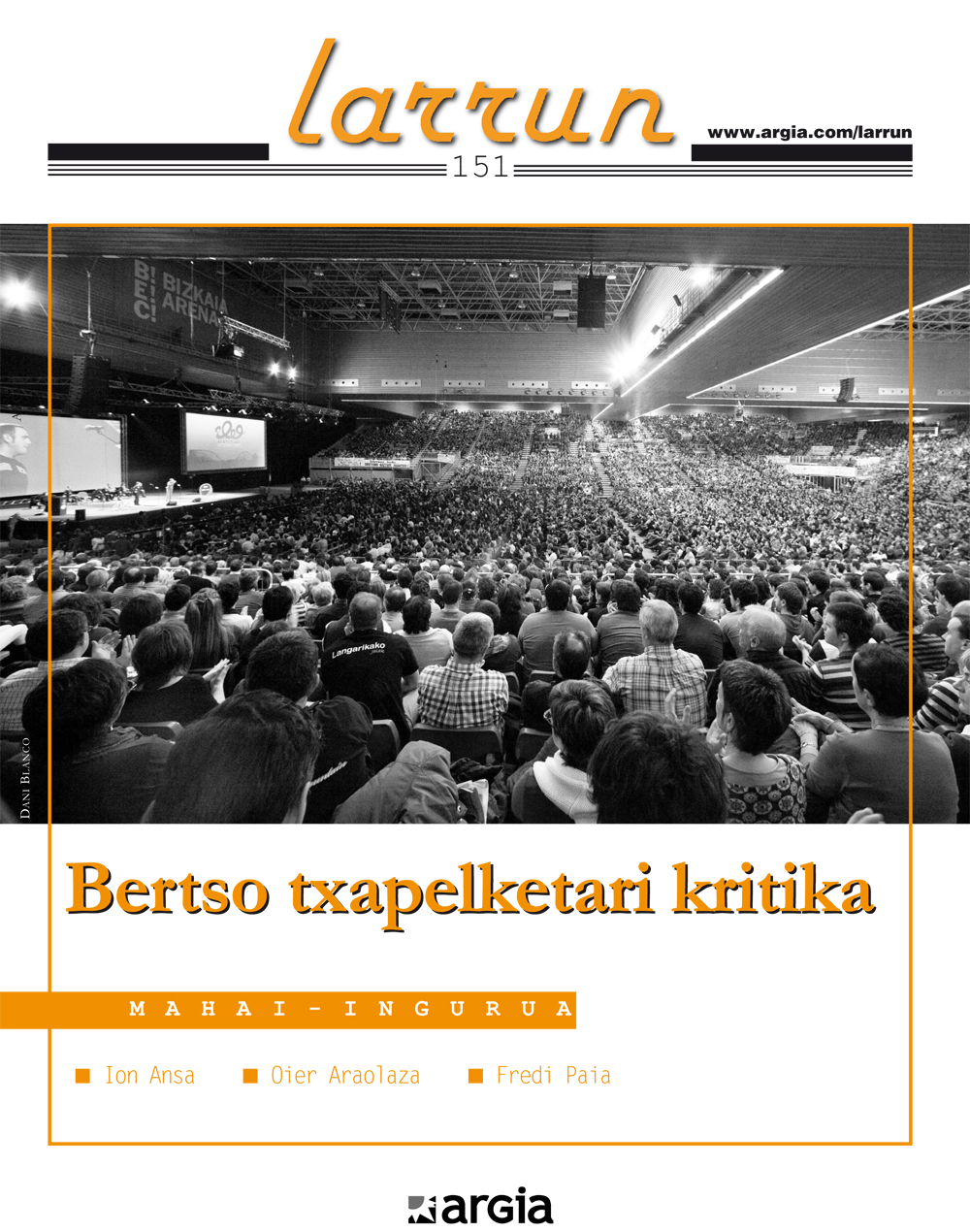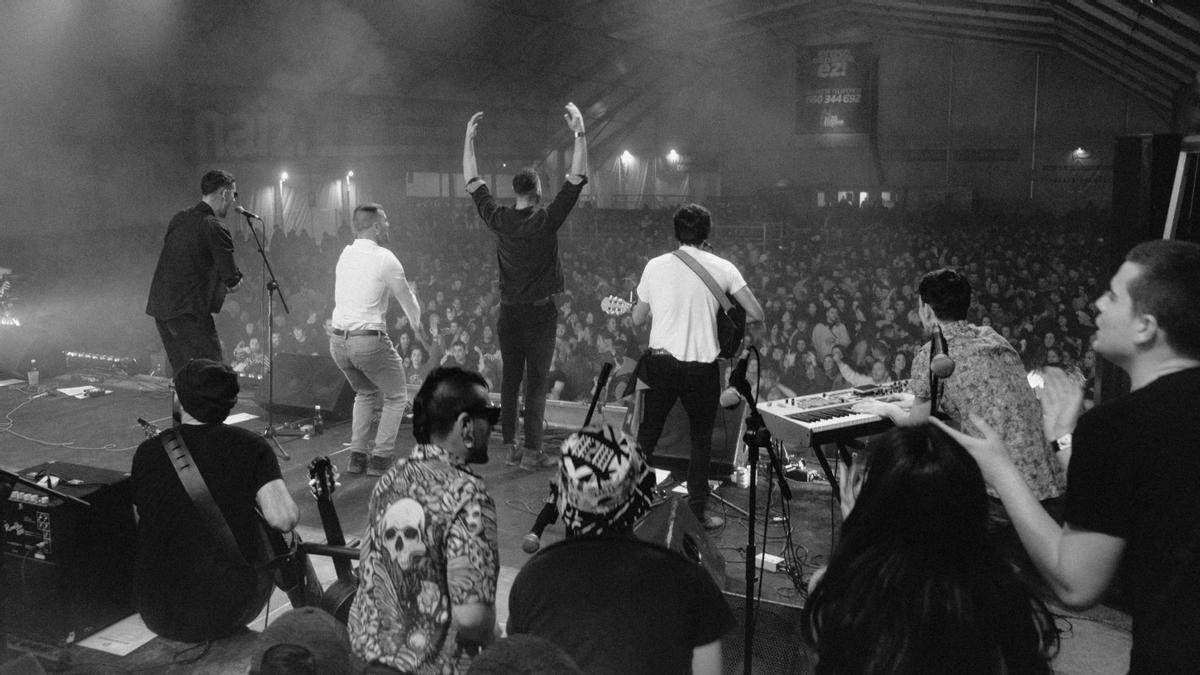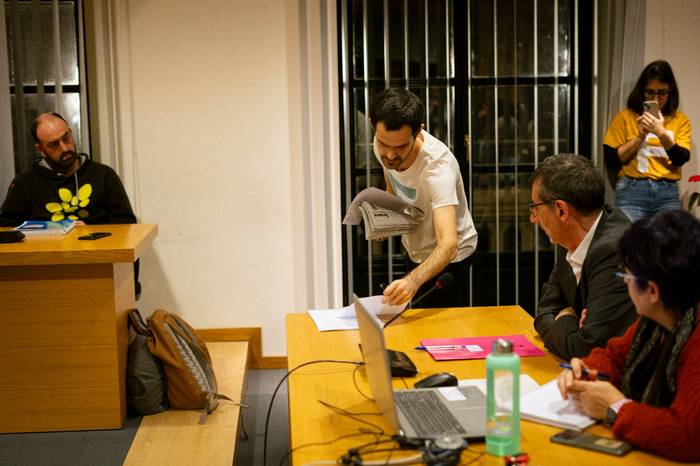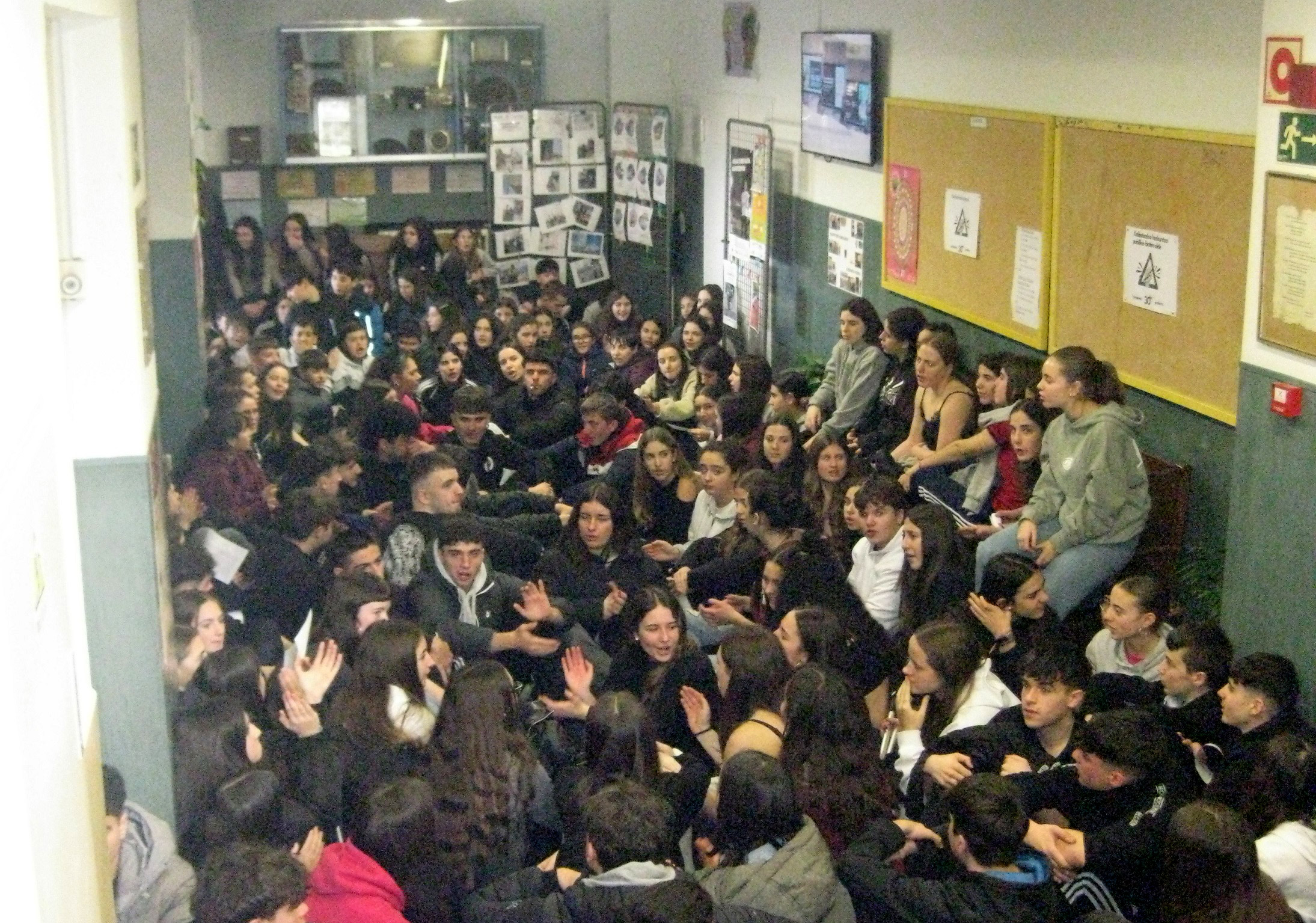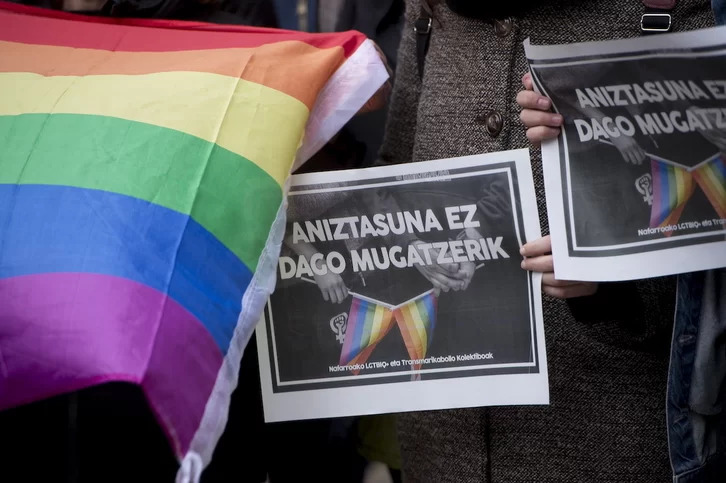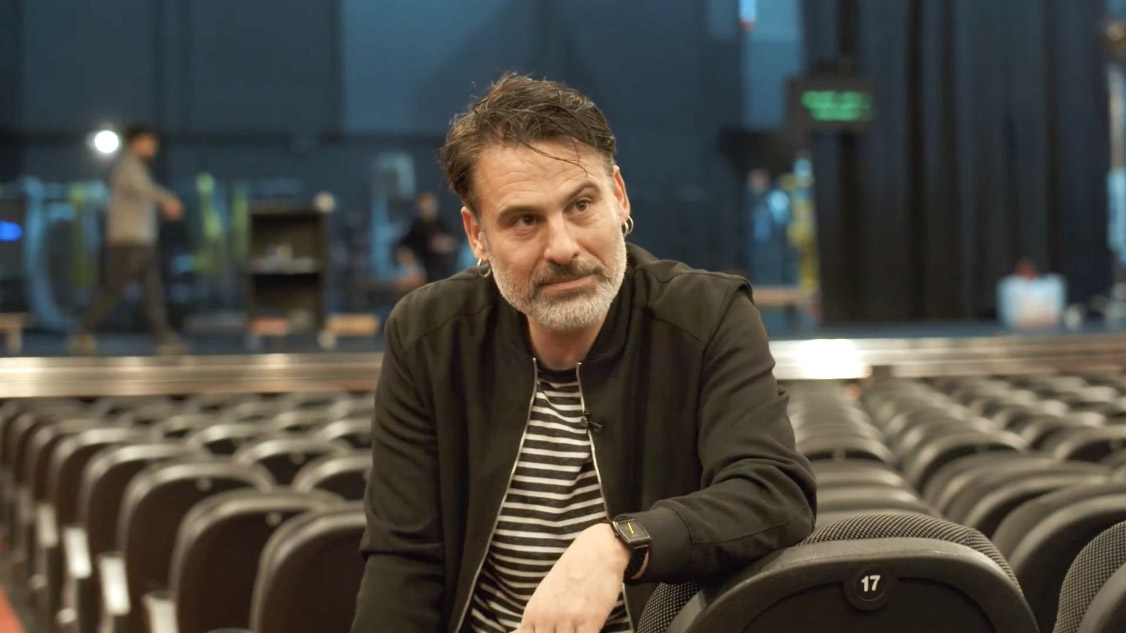The absurd game that legitimizes the system?
- From the 26th of February to the 12th of March, the Bertsolamaritza IV Despuesta de inertias, Euskal Herria Bertsozale Elkartea has organized a series of days in which we put on what we are. Ten speakers will be eliminating the rust of everyday life in different fields (humor, creative process, thematic...). Three of these will deal with the inertia of the tournament and its impact on the bertsolarismo system, which we have grouped together in Larrune. You have a different view of bertsolarismo in it, because everything is from where you look. You have the opportunity to respond either on the website argia.eus or by participating in the Bertsolamikoa conferences (see the programme on the back cover).
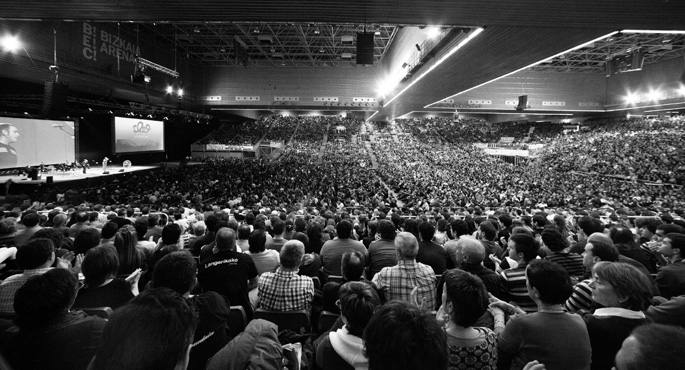
Let's examine the tournament within the system. How would you describe the system of bertsolarismo and where is the tournament located within it? What functions does it perform?
Assisted by ION ANSA. The study of the system of bertsolarismo is still to be done. And it is necessary to do so to know what we are doing and in what situations we are in. In my opinion, the system is based on an idea: the division between good and bad. Not the good and the bad, but the good and the bad. These are two extremes and this language is not used, but a hierarchization is carried out and as a result a complete structure is derived. There are different organs that move around this concept and in the end we arrive at a system of the “elite” that is at the center of the verse: that is the reference, that is the influence... What is the function of the tournament? Perpetuation is the goal of all systems, and the tournament, among others, performs this function. It nourishes and strengthens the system and guarantees the legitimacy of the system.
You said “good and bad.” Who creates that? The public, the squares? The more sessions you do, a sign that you're better?
I. I. I... From the ANSA. There is one thing in bertsolarismo that is difficult to find in other artistic expressions, and it is the legitimacy that is recognized to the tournament to form this hierarchy. The tournament gives this legitimacy, the “labela”.
Assisted by FREDI PAIA. It is achieving the most today. In the last sociological survey of versionality (2006) we saw: ask people “who is the best bertsolari for you?” and in the answers 100 names appeared. This is the reality that the tournament has not been able to break so far. It is currently succeeding in breaking this diversity through, among other things, the transmission model. In some verse schools young people clearly see that some bosses go to tournaments and some don’t (and some choose to take the path of those who don’t go to the tournament), but the system doesn’t allow that. It hides the second reality. At one time they gave us sessions of bertsolaris from Palabra Goierri, and you said “nobody goes to the tournament there, but they do sessions and look how much fun they have”. We’ve taken that all out of focus.
Returning to the system and the task of the tournament...
BY OIER ARAOLAZA. I live the tournament system from the world of dance, and some of the things I’m going to say may not fit well with bertsolarismo. When we talk about functions we have to distinguish two things: one is the function we seek or expect when starting a tournament, that is, what our expectations are, and another is the other function that, in practice, performs, together with or against these functions, or substituting them. I am interested in this second aspect, because in most cases some functions are not recognized, which then function de facto. Of course, the functions that we remember when we organize a tournament are the ones that will benefit, and we do not mention those that can be harmful to some extent or that can be called “collateral damage”. But then they happen. And in some moments and sectors, such as dancing, dysfunctions weigh more than functions. And then the tournament itself is compromised.
I am interested in studying the strength of the tournament as a creative model. This happens at different levels: on the one hand, the very fact that the tournament is organized means that it is accepted that there must be some models. And also that these models can be organized hierarchically. So that there are some better ways to verse or dance than others. That is, when we organize the tournament we assume that a classification can be made. There are better and worse. And on the other hand, once the tournament is launched, the tournament expresses very clearly what this model is or what they are. And with the specification of these models, it expands them automatically at the same time: the tournament has a tremendous strength to fully expand, expand these models. In this sense, the tournament is a very powerful mechanism against diversity. That’s why I think it’s bad at times and in many systems.
I'm talking about F. From the PAIA. I would like to point out first that the tournament has not been created by the player. When it has been up to the bertsolaris to compete, he has historically used another formula: challenge. What's the difference? The protagonists in the challenge are the two bertsolaris. In the championship the bertsolaris are diffused and the structure itself acquires strength, the championships.
When is the system created? Any artistic expression that is an individual activity when it is intended to be used structurally for collective interests. The tournaments were created in the 1930s by some associations that wanted to exploit bertsolaris: The Basque Government and others, for functions related to linguistic policy (it is not by chance that this decade was born, in a time in which patriotism is in its infancy). Tournaments are created by agents who are external to bertsolaris. In 1986, the company had to organize itself, why? It was already in the hands of others. And because the external entities decided how they would be measured, who would be good and who would be bad.
If you are going to build a system around bertsolaris, the acceptance of bertsolaris is essential: The tournament is a tool to ensure this. He used it very well in his time. The tournament was, to a large extent, a “trap” to support this system that was about to be created around a phenomenon like the bertsolari (quite uncontrollable, present in many places, each with its own idea and way of doing...). Because there is a game there, one shadows the other, one cannot live without the other. Today, too, the tournament is a tool to justify the centralization of the Association, to say: “Yes, I take 99% of the support for this art, but I have the full approval of the creator to do this.” Without this it is impossible, if the bertsolari does not legitimize it, the Association has no meaning or strength. And since the bertsolari has to go to the championship to survive, there is no way to live without legitimizing the Association, thanks to the tournament.
Then there's where the focus is. When any verse initiative has 200 sessions per year and the Association does not assume the responsibility of recording any of these sessions, this is where the system and ecosystem are seen. Where does the system put the focus? In the sector that legitimizes him. Because the out-of-focus sectors, which are very broad (suddenly a bertsolari appears to us in Zubero, suddenly there are people who come together and work in Barakaldo...), this does not legitimize the Association and therefore they are not factors to be emphasized.
I. I. I... From the ANSA. I completely agree with the idea of the focus, the fact is that there is much more that is out of focus than what is in focus. Instead of leaving all this out of focus with this system, let's level it up. Of course, this requires breaking the idea of “good” and “bad.” If we want to consider bertsolarismo as an artistically legitimate expression, we cannot speak in these terms, “the best” and “the worst”.
We can't talk about models. Musicians don’t talk about models, they talk about influences. We are associating bertsolarismo with characteristics that have nothing to do with bertsolarismo and creativity: tournaments, markets, audiences... all this is based on the idea of good and bad. The fact is that when you break that idea, you disguise everything that is structured behind that idea, which is also inside of us. Because the ideology is transversal, we are assimilated by gerons and we also take it into account in the process of its creation, we constantly give it legitimacy. The key for me is to break that thought.
Oh, that's right. Assisted by ARAOLAZA. What are we talking about when we talk about storytelling? About the communication? Of artistic creation? Because if we talk about communication, the valuation of this “good” is directly related to the context and the moment: “Good” is what makes that communication work at every moment. But the same person can be very good or very bad in different contexts and at different times. So if we’re talking about communication, we can’t play the classifications of good and bad. If we talk about artistic creation, ugh! Even less so! Precisely, the more different or more prone to rupture in artistic creation, the more interesting it seems to us, I don’t know “better”. What the tournament is based on is the recognition that there can be good and bad ones and we will also organize them from the first to the eighth! And this is a step against the basic functions of the activity.
Fredi mentions that being economically viable is one of the main functions of organizing the tournament at the moment. But I think there is another very important one: to make it visible through the media. We cannot forget that we live completely in the media society, and that the success of things is also measured by the media presence. And the tournament gives him a media presence that nothing else would give him and all the rope next to it. All the other actions that you mention in this ecosystem are also articulated and revitalized thanks to this media wave that generates the tournament. The question is whether this media success is a goal or not. And if so, then that’s a good game for the championship.
I'm talking about F. From the PAIA. And what an opportunity it costs, because every time you do one thing, you're not getting anything else. I still see that there is a lot of life outside the tournament. What I don’t see is very clear that if we continue with this model, in fifteen years there will be a lot of life outside the championship. It seems to me that the generation that we are creating works with the logic of “tournament or death”, besides the tournament from a totally Darwinian perspective: if I serve for the tournament I serve for the verse and if not, I don’t.
To conclude with this topic, a little schematic: the strength of our tournament is the consequence of our organizational system. And that’s what we’re creating as well. If the Bertsozale Association were not a concentration (almost all funding goes to this centralized structure), if our center of gravity were in verse schools, as in dance groups, the tournament would have a different weight and we would live it differently. For what reason? Because it would not be so vital, because we would have the means to create weighty alternatives, whether we participate or not. The concentration of resources in bertsolarismo is very high, and outside the system surrounding the tournament there are few habitable ecosystems. We are doing a very good job in broadcasting, creating a lot of bertsolaris, and the future we offer is a funnel. Players who don’t have a place in the adult tournament, where do they place themselves? There is an alternative, self-management, which has proliferated and works in recent years (“Fill the hat verse”, etc.). Get on with your own initiative.
Oh, that's right. Assisted by ARAOLAZA. I find it curious that from the field of bertsolarismo we consider dance as a model of organization, when the drama that we have lived in the world of dance for the last 30 years is the inability to organize ourselves. For the last 10 to 15 years, the world of verse has been looked upon with envy and as an example since dance, because of its internal cohesion and its ability to organize a system.
I'm talking about F. From the PAIA. What I am proposing is not to go to the other end, to remove our national structure and to go only to the regional organisation. But I think we've gone to the other extreme. What I'm saying is that we need to find a balance. For what reason? There are things that go wrong in a day because the engine is the regions. The diversity is there, the diversity that would make our project much more attractive to society.
You have said that the tournament places one model above the others and expands it with great force. Are the models necessary?
I'm talking about F. From the PAIA. As Oier has said, the tournament is the opposite of diversity. We need models, the problem is that we have the Model. Model of the winner of the tournament. And then the tournaments adapt to this model: the formulation of the themes...
I. I. I... From the ANSA. I'm the opposite of the models. Models are not needed and it is not healthy to have models. I put the accent on myself. Creating is a very personal process and it is one thing to have influences, to feed them, to influence each other... and it is another thing to follow the patterns. I believe that one of the pillars of ideological change is precisely this, not needing a model.
Oh, that's right. Assisted by ARAOLAZA. I have doubts. I don’t dare to say that we shouldn’t, I think that they are important, often so that one can direct one’s path to one side or the other, to inspire... if these are influences, or if they are models? I don't dare say it. But the relationship between the models must be complementary, offering different colors. Not a hierarchical organization.
I. I. I... From the ANSA. I find it hard to give up one’s ability to create in order to follow a different model. I believe that we enter into imitation, and that this is self-denial.
Oh, that's right. Assisted by ARAOLAZA. But in training for the creation process, you need models where you put your technique and tools for creation at the point of imitating them.
I'm talking about F. From the PAIA. The learning process is imitation. The point is that we need models in the plural. What's going on? Today we are going to the model more and more. We of our generation are much more die-hard than our predecessors. Looking at the rhyme, etc., we are people of a mold, because we have followed some models. But I believe that this process also goes into the funnel. I see those of a generation as imitators of Egaña, and now the same thing will happen to Lujanbio. As the champion changed almost every two years in our childhood, the models were there. It will have to do with the consequences of a model being a champion for sixteen years.
Children learn by imitating. It is the work that remains for us, to identify what is good from each model. For example, I would talk about Mañukorta: how can it be an “old shit” for the most experienced people in the Basque Country at any given time? We're calling the audience a fool in the face. This expert approach is what enters our students’ minds and what the ideology that radiates from the system says: Mañukorta is of no use as an example. But at the same time, the people wanted Mañukorta.
I. I. I... From the ANSA. When we say that the learning process is imitative, I do not know if we are talking about the same thing: it is one thing how we have learned what we have learned, and it is another thing to learn how to do what is said “from oneself”. This cannot be imitation. This does not mean that there are no references and that we start from scratch.
When the tournament is criticized, the question arises as to whether another tournament would overcome these damages. Can a good/fair tournament be held?
I. I. I... From the ANSA. It's a good tournament if you meet your goals. What exists today is incredibly good for the current system. It’s an ultraprectioned thing. As Erro Colina said, the final of the BEC “is like a jubilee squad, every year one falls” and a new one is introduced, and we have succeeded in justifying it and approving it, precisely at a time when there are more bertsolaris and a more powerful movement than ever. So it must be very good. Can a fair tournament be held? It can't be.
And is it possible to judge the verse? Define good and bad and measure them in points?
I. I. I... From the ANSA. Well yes, you just have to see it, it’s constantly measured in points. The good and bad verse can be measured from the moment we begin to name it “good” and “bad.” But what's the value of that? The question is whether we want to measure it or not. In short, the question behind this is what verses we want to build, and what will be the bases of these verses. If we want the current system, let’s continue with the tournament because it does its job very well. Now, if we want to strengthen bertsolarismo as an artistic work and incorporate it culturally in the path of the popular movement, I think we are a bit deviant. We must ideologically question the very structure of the system.
I'm talking about F. From the PAIA. But this task of naming the “this is the good and this is the bad” mentioned by you is not done! What the tournament does is distinguish between good and bad bertsolaris, not between good and bad bertsolaris. For we have seen the bad verses score much from the mouth of the “good” bertsolari, and the good verses score little from the mouth of the “bad” bertsolari. The debate is useless, it is going to happen. But we can't tell the judges: “Don’t worry, you’ll always be wrong.” The aspect of the professionalization of judges has been completely neglected, the judge should be a person known in the verse world for his knowledge and authority. This is the only condition for the tournament to give you a little guarantee. But what we do in these verses is quite the opposite: the one who has not become a lawyer is a judge. And the judge must be the best lawyer. It must be a person who tells me “Fredi, 5!”, “but it is the verse of Christ!”, “5! You did this and this and this.” And you'll say whether to convince or not: “He knows a lot.”
I. I. I... From the ANSA. But the judges aren't there for that.
I'm talking about F. From the PAIA. The judge has to do that. Any system of justice is based on judicial authority.
I. I. I... From the ANSA. You're saying that the tournament should be organized according to justice, and that's not what this is about.
I'm talking about F. From the PAIA. But justice should be the goal! If we are going to swallow this melon, let’s try to make it of the best quality possible. We've completely neglected the judiciary! How many hours a year do the judges spend?
Oh, that's right. Assisted by ARAOLAZA. I do not believe that we can organize a communicative or artistic action in a classification, as in sport. I totally agree with Alfonso Sastre, it is interesting to give awards in the field of art and culture. We need to reward those who are doing well. And we identify who is doing well in a moment. But awards are one thing and competitions are another. And organize the different creators in a list “this is the first, this is the second and this is the third”, “this is better than this”? This has neither a mind nor an ear, neither from the point of view of communication nor from the point of view of art. And if I ask for something from versionism, it is communication and creation. Can you give me anything else? I don't know, maybe the judges identify something else and that's why they're capable of judging it. But communication and creation cannot be judged in this way. In communication, if there are 14,000 people in the final of the tournament, each of them will receive and interpret the message according to their being and context, in each of them the same message works differently. So we can't match them with a number! From an artistic point of view, they are made, “the best works of art of this last century”, and they are also classified, but they have a purely media interest, they are made to sell the newspaper.
I. I. I... From the ANSA. But that's the thing, what's it done for? To legitimize what?
Oh, that's right. Assisted by ARAOLAZA. Let's have a contest between Bach, Mozart and Vivaldi. And we'll find criteria to judge, eh! One will immediately say, “The one who made the longest symphonies 2 more points, and the one who has included more notes...” everything you want! But does that make sense?
You have brought to the table the purpose for which this classification is made. Let’s examine the reasons for the tournament.
I. I. I... From the ANSA. We have already said that the function of the tournament is to legitimize the system, and that is what it is done for. What is actually an absurd game (and I like absurd games and I like the tournament in that sense) is used to legitimize it. The problem is when we disguise this and give it a link that doesn’t really have it: when we ask the judge to reason why that verse is five. That's not a judge's job. You can't give a judge the power to decide if your verse is good or bad.
I'm talking about F. From the PAIA. But it is already given, de facto!
I. I. I... From the ANSA. You're giving Zeror jurisdiction from the moment you ask him to judge you.
I'm talking about F. From the PAIA. If we're going to get into this absurd game, if it's going to be judged, it's going to be someone with authority. The audience doesn’t go to the judges, they go to the judges. Because if you put those eight runners-up in the final any other day at the BEC, 10% of the people won't go. So who are you going to see? The judges, the judges!
You say it’s absurd, but if it’s so from a verse point of view, then why do the bertsolaris go to the championship? If the players refused, there would be no championship.
I'm talking about F. From the PAIA. Because there are only two paths: either the championship or the self-management. The bottom line is that many of us work within the week to be able to work on weekends. But that kills you. If you plan to live differently, the only option is the tournament. In dance it is not like that, a dance tournament is organized, but then three other dance schools come together and can organize another tournament or another movement with the same weight as the previous one. Because there are other counterweights. But if today the Association organizes a tournament, there is nothing else related to the verse in the Basque Country that can build an alternative with a quarter of the shadow of that, due to the way in which the resources are distributed. What is self-management speech? “Those are the ones who can’t get anything in the tournament and want to do the sessions that way.” The message that is received is contempt and wood. If Fredi were the champion of Biscay he wouldn’t be there!”, I would be saying the same thing, also with the weight of the hat.
From what you have said, it is possible to think that those who want to live by the verse have no other choice. How many singers, 15-20 from all over the Basque Country? There are only 70 players in the championship.
I'm talking about F. From the PAIA. Hoping to get into those fifteen.
I. I. I... From the ANSA. This is the idea of capitalism: You'll always be screwed, but you'll always have a little hope of getting up. It’s not just that, the tournament itself is a session and we’ve gone to that, to do one more session. And another reason is to follow the current.
Oh, that's right. Assisted by ARAOLAZA. And because we like competition as a value in this society: “More than me.” I don't think everyone who goes to the tournament is going to win. But it's a seventeenth rather than a eighteenth. This is already a strong motivation. So far I have been talking about the reasons against the tournament, but there are many reasons why the tournament is organized, and that is why it is organized: the economic is essential. The media, at all levels: not only during the tournament, but because of the impetus that this gives to the whole verse. And there is another function: the trampoline. Those who want to participate in this activity must first make themselves known, for which the tournament works very well. All too well, only those who have won the championship in the world of dance have managed to make themselves known at a specific time. And when they meet you they call you both for performances and other projects, and if that brings you a source of income, you can offer more dedication. In the field of dance, the tournament has been the only trampoline that has existed for many years. Let's do a test: Let's see, get rid of the names of the dancers.
Assisted by Kimetz Larrañaga...
I'm talking about F. From the PAIA. Jon Maia, with Edu Muruamendiaraz...
Oh, that's right. Assisted by ARAOLAZA. All three of them came out of the tournament. Participation in dance competitions has been much lower. To give a number, if there are a thousand dancers in the form, only 10-15 are presented. It is conceivable that there will be many good ones among the thousand others, but they have not had the opportunity to make themselves known and make their way in this activity because they have not decided to participate in the tournament.
What other trampolines are currently dancing?
Oh, that's right. Assisted by ARAOLAZA. He's not here. That’s why the tournament plays a very important role.
I'm talking about F. From the PAIA. There is a difference in dance, related to the schools of verse: the character of the group. Even if you don’t go to the dance tournament, you have a guaranteed dynamic that depends on your team. The work that is done in the schools of verse is similar, that is why we give importance to the creation of gangs among these bertsolaris. Be groups of 3-4-5 people, then soften your personal failures and feel “I’ve got all this here.” But I think a lot of people go to the tournament because they live the bertsolarismo in solitude. You don’t find a team structure around you that meets your needs, giving you several sessions a year. For example, in our country, we know that if you go to the Ajuria bar in Algorta on Tuesdays, there is something to do in verse. And for some people, that's enough, one session a week. If you don't have that either...
Oh, that's right. Assisted by ARAOLAZA. I get a smile because those traits that you consider negative have been considered positive by me and vice versa. For you, the uniqueness of bertsolarismo is negative, and for me it has always been positive. In a group there are very different rhythms and intensities, but the dance inevitably requires teamwork and we have not been able to move forward. And looking at bertsolarismo I’ve always thought, “Of course, since these are solo, you bet on yourself and you go ahead, no matter if the back doesn’t come with you.” And if you don't dance backwards, you're not going anywhere.
I'm talking about F. From the PAIA. Okay, on that one. But it also has this other side: most people who have abandoned bertsolarismo have abandoned it in this loneliness because their personal bet has failed and they have not found anything around it. I also received an incredible kick in the Championship of Bizkaia, and I spent fifteen days without wanting to do it in verse (and for me that’s a tragedy like losing sexual desire), but you come to the verse school, you go to the bar, and after the drink you get a smile with your verse and the peanut, the day has passed. Although you know that versioning is a work in itself. Back to the topic: The positive reasons for holding tournaments are a thousand. But not only from the perspective of the Society. As a Basque and patriot, if it were up to me whether or not to hold the championship, today my answer is “yes”. What a Basque culture it is. Today, many people look at us like flags. And thank goodness there is BEC.
As in the past, do we need to use these for other purposes?
I'm talking about F. From the PAIA. Of course, of course. From an artistic, improvised point of view, the tournament has neither legs nor heads... but from a social and political point of view, the tournament continues to fulfill the objectives it had when it was founded: to promote Basque culture and, to a certain extent, Basque patriotism. To see how 14,000 people were put up with the verse “The Basque Country is a book, it is not, but it will be”, and many other things, and those chicken butts and feelings would not have happened if social presence were not forbidden and many things were not forbidden to be said publicly. It was a collective political catharsis. Here’s another problem: I compare it to the final of the Copa del Rey Athletic. “How beautiful it was, how exciting...” but my fellow football fans were commenting on whether or not “4-4-2” was okay, whether or not there were too many defensive distances from the middle of the field... we can’t do that in verse. What do all the articles on the finale talk about? About the party that was formed around the football match in Valencia! About the football? It's the zero. As a bertsolari I denounce this: all right, as a social and political tool, this country needs a bertsolari championship. Our culture is mainly childish. Our summer song is a pre-school teaching material. Three of the four libraries that are published are for children. We have more writers than readers and our writers are what they are if they sell in Spanish and the Spaniards say they are good. The situation is worrying, and in this context, the bertsolari tournament must be held. And if we get 250,000 viewers instead of 14,000, it's better. It is a popular, political and social action. The tournament must be held, and even if I don’t show up, I will participate in the organization. Let’s not confuse that with art.
I. I. I... From the ANSA. You didn't read my final article, then. And at the beginning of the article I was saying this: that the only things that make sense of the tournament are precisely the things that transcend bertsolarismo. If we had a little more awareness of being our bertsolaris, we should really feel bad in this type of environment. It is a massive attack on creativity and diversity. Turn the verse into a spectacle that also incorporates so many of the values that the market has... In the last tournament, the truth is that there were many times when I felt bad from the audience looking at the circuit.
I'm talking about F. From the PAIA. There was great populism.
I. I. I... From the ANSA. In view of what is being applauded, if we elaborate a little on the critical point of view... For me, that’s why it’s important to create one’s own example... because as we work on it, we naturally work on the attitude that goes against that circus. When one cultivates one’s own verse and to the extent consistent with it, one will inevitably collide with a whole system that is artistically meaningless. Just as a musician who wants to develop his own path in music collides with the music market. That is why the key to the change of verse is.
Please explain the keys to this change.
I. I. I... From the ANSA. The change may be provided internally or externally. I see more that the change will take place from outside the system, that is, it will change according to what is done from outside.
I'm talking about F. From the PAIA. Yeah, but there's one thing we have to keep in mind. The other day I loved what I heard from Beñat Gaztelumendi: he and his brother Unai do the same number of verse sessions throughout the year. And his brother is repeatedly asked in the street if he has left the verse. That's the hardest part. The system has led society to believe that nothing is out of focus!
I. I. I... From the ANSA. But in what key?
I'm talking about F. From the PAIA. In the media, at the level of acceptance... those who want to make their way from the outside will have to answer the question “Have you given up on bertsolarismo?” again and again. Because that's the speech. A “great” writer once said to me: “You do a lot of things, but all of them when you’re young.” What's that, stupid cake?
I. I. I... From the ANSA. This is hard because you have internalized a whole system of values, because you already ideologically accept that. Mediatism is very cruel, it is necessarily associated with a minority. It's about overcoming that. Without going beyond that, you want to form Aspe and Unsaturarce: both with the same goal and both with the same account.
I'm talking about F. From the PAIA. I totally agree. That's Eleven Virtues to me. The difference with the ball is that the Association obtains resources to invest in a very small area of territory (part of Gipuzkoa) in exchange for acting on behalf of everyone for the benefit of a few. The media is the only way to make people aware of our work, the only way to give diversity a real opportunity. And then my question is: What the hell am I painting at the Society? The Association’s bet is different, it goes a different way and it doesn’t even have a Foreign Ministry to say: “You are the inhabitants of darkness.”
I. I. I... From the ANSA. That’s why I’ve said that the outside will affect the inside as it develops. It is based around the best systems and a minority. If the system were to change, we shouldn’t be creating anything outside of it. They are creating things outside of the association, and more and more will be created.
I'm talking about F. From the PAIA. That’s where I include verse schools, regional verse associations. I believe that the development of the schools of verse will be growing.
I. I. I... From the ANSA. Looking forward, I see two areas: on the one hand, that bertsolarismo will develop as an artistic work. And the key to this is the bertsolaris and the critics. The figure of critics is necessary, we need a theory of bertsolarismo, based on scientific studies. We need serious literary criticism, not a sudden score of 5 or 6 in the tournament.
I'm talking about F. From the PAIA. Don't you see that as related to the authority and professionalism of the judge?
I. I. I... From the ANSA. I don't give that authority to a judge. I cannot allow the artistic activity to be based on numbers. In cinema, the film is starred, but film critics and filmmakers do not take this seriously. That's a paraphernalia, the commercial part. Since I don’t value the tournament from an artistic point of view, there is a popular jury that I almost prefer to someone who will put themselves above everyone else.
I have already mentioned that I see the path of the prestige of the work of creation from the perspective of the future. And on the other hand, that bertsolarismo is based on the cultural movement, that is, that the economic and political system is another that is more based on the schools of verse.
Oh, that's right. Assisted by ARAOLAZA. The basis of the change is the rupture: Break the consensus around the concept of success. That's the key. Success can be identified quantitatively, the more economically, publicly, mediatically, by the number of bertsolaris... But we can define success in a thousand other ways. If each one conducts appropriate communicative actions in verse in his own country, there is no greater success for that person and that environment than that. This can also be the ideal model of success. More successful than Mañukorta in her journey from neighborhood to neighborhood, no one will find it. And maybe for Mañukorta feeling of not being valued in the tournament is not a failure. Because the framework of its success is another. He doesn't need the championship at all. At the moment, it is a success to have a strong presence in society as well. Is this BEC requirement a success? Or are we on a path that doesn’t interest us?
I'm talking about F. From the PAIA. Each one will have to analyze which path satisfies and which path does not. But we must not forget that we are spreading a message in society. I've seen a big change in my teaching career in ten years. And it's the BEC, and it's the championship, and the championship, and the championship. There was a time when the students told you about the verses “I liked this verse and I didn’t like this one.” Today, students are talking about art. This is a double game: let everyone do what they want and think what they want, says the system. All right, all right. But there are policies that have certain consequences and are carried out on behalf of all.
Look, the tournament will be held for reasons that have nothing to do with bertsolarismo, as it has been throughout history. As it will be done, let us strive to be of the highest quality in all its fields. And the precinct that is just the key, we can't leave him orphaned! Ansa, according to the approach you said, you give the critic the role that the judge should do. Then let the critics enter the judge or the judges to the critic. But if we have both, what are the judges, some puppets? and the critics are for what “all this is a farce! Shall I tell you where the matter is going...”
Oh, that's right. Assisted by ARAOLAZA. This contradiction happens to me: I have to admit that the tournament will take place. So, how would I like it? I always think: “With the broadest possible valuation criteria.” Well, that's the best way to wreck any tournament. Because with the technique, with the math, we all make amen. But when we begin to consider the other dimensions, there may be more instances, such as the entire audience being against what the jury has decided. That's why tournaments are absurd. If one day Mañukorta is crowned champion, it's over!
I'm talking about F. From the PAIA. Oh, what a coincidence! We are very disciplined. Despite the serious things that happened in Bizkaia in 2004, still unclear, we all accept the verdict, even if we do not understand what the judges say.
Oh, that's right. Assisted by ARAOLAZA. Yeah, I've been paying attention to how silly you guys are with the system.
Ion Ansa
1977an Oiartzunen sortu bazen ere, Oreretako Xenpelar Bertso Eskolan eman zituen bere lehen urratsak bertso munduan duela 17 urte. Geroztik, bat-bateko sariketetako epaile izan ezik, bertsolaritzaren baitan dauden gainerako lan guztietan aritu da: bertsotan, gai jartzen, Hitzetik Hortzera programa egiten, txapelketako saioen kritikak idazten...
Oier Araolaza
38 urteko eibartarra. Pasio du dantza, eta ofizioa ere dantzaren inguruan antolatzen saiatu da azken urteotan. Kazetaritzan eta Antropologian lizentziatua, Artearen Historian eskuratu berri du "ikertzaile nahikotasuna" soka-dantzaren inguruko ikerketa lanari esker. Azken urteotan dantzan.com elkartean komunikazio, kudeaketa eta formazio lanetan dihardu.
Fredi Paia
1981, Algorta, Getxo. Bertsolari, musikari, etnografo eta iritzigilea. Euskal kulturaren biltze eta ikerketa lanean eman ditu azken urteak Labayru ikastegian. Hainbat bertso ekimenetan aritu da, sorreratik: Txapel Bete Bertso, Zaharrak Berri Tour, Bertso Tranpak, Hudaltzainak, Payadoreak... Algortako Bertsolari Eskolako kide da.
Vagina Shadow(iko)
Group: The Mud Flowers.
The actors: Araitz Katarain, Janire Arrizabalaga and Izaro Bilbao.
Directed by: by Iraitz Lizarraga.
When: February 2nd.
In which: In the Usurbil Fire Room.









